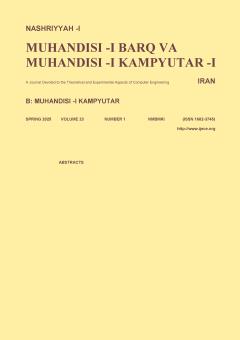Presenting a Personalized Web Recommender System Based on Sequential Clustering and Deep Auto-Encoder
Subject Areas : مهندسی برق و کامپیوتر
M. Moeini
1
,
Ali Broumandnia
2
*
![]() ,
Mona Moradi
3
,
Mona Moradi
3
1 - Dept. of Software Eng., South Tehran Branch, Islamic Azad University, Tehran Iran
2 - Dept. of Software Eng., South Tehran Branch, Islamic Azad University, Tehran Iran
3 - Dept. of Software Eng., Central Tehran Branch, Islamic Azad University, Tehran Iran South Tehran Branch
Keywords: Recommender system, user profile, auto-encoder networks, collaborative filter.,
Abstract :
The amount of information published on the web has made the use of recommender systems inevitable. Web recommender systems provide users with accurate and relevant recommendations based on their interests and tastes. These recommendations can help users quickly access the information they need and reduce search time. In this paper, a hybrid recommender system based on the combination of fuzzy sequential clustering and deep Auto-encoder network based on user profile information and ranking of websites by users is presented.
In this recommender system, users are first sequentially clustered according to the similarity of their opinions. Then the new ranking for users is predicted according to the fuzzy membership function. Finally, the information in the user profile and the new rating of users to each website is used as the input of the provided deep Auto-encoder network in order to predict the ranking of websites by users. Finally, after finding similar users, It provides recommendations to visit and personalize the web page of new users based on the favorite websites of similar users. The proposed method has improved compared to the following classification methods due to the layers of deep learning and completion of the learning process in the middle layer: In terms of statistical accuracy, about 42%, and the ratio of successful recommendations to useful recommendations is about 4%, and the accuracy of recognizing similar users is about 20%.
[1] H. Ko, S. Lee, Y. Park, and A. Choi, "A survey of recommendation systems: recommendation models, techniques, and application fields," Electronics, vol. 11, no. 1, Article ID: 141, Jan.-1 2022.
[2] D. Roy and M. Dutta, "A systematic review and research perspective on recommender systems," Journal of Big Data, vol. 9, Article ID: 59, 2022.
[3] S. Ephina. Thendral and C. Valliyammai, "Understanding personalization of recommender system: A domain perspective," International Journal of Applied Engineering Research, vol. 13, no. 15, pp. 2422-12428, 2018.
[4] A. Papagrigoriou, C. Panagiotakis, E. Kosmas, and P. Fragopoulou, "Collaborative filtering recommender systems taxonomy," Knowledge and Information Systems, vol. 64, pp. 35-74, 2022.
[5] S. Eliyas and P. Ranjana. "Recommendation systems: Content-based filtering vs collaborative filtering" in Proc. 22nd. Int. Conf. on Advance Computing and Innovative Technologies in Engineering, pp. 1360-1365, Greater Noida, India, 28-29 Apr. 2022.
[6] M. Yu, T. Quan, Q. Peng, X. Yu, and L. Liu, "A model-based collaborate filtering algorithm based on stacked AutoEncoder," Neural Computing and Applications, vol. 34, no. 4, pp. 2503-2511, Feb. 2022.
[7] F. O. Isinkaye, Y. O. Folajimi, and B. A. Ojokoh, "Recommendation systems: Principles, methods and evaluation," Egyptian Informatics Journal, vol. 16, no. 3, pp. 261-273, Nov. 2015. [8] G. Behera and N. Nain. "Trade-off between memory and model-based collaborative filtering recommender system," in Proc. Int. Conf. on Paradigms of Communication, Computing and Data Sciences, pp. 137-146, Kurukshetra, India, 7-9 May 2022.
[9] A. Darvishy, H. Ibrahim, F. Sidi, and A. Mustapha, "HYPNER: A hybrid approach for personalized news recommendation," IEEE Access, vol. 8, pp. 46877-46894, 2020.
[10] Q. Shambour, "A deep learning based algorithm for multi-criteria recommender systems," Knowledge-Based Systems, vol. 211, Article ID: 106545. Jan. 2021.
[11] Y. Gulzar. A. A. Alwan, R. M. Abdullah, A. Z. Abualkishik, and M. Oumrani, "OCA: Ordered clustering-based algorithm for e-commerce recommendation system," Sustainability, vol. 15, no. 4, Article ID: 2947, Feb.-2 2023.
[12] S. Lee and D. Kim, "Deep learning based recommender system using cross convolutional filters," Information Sciences, vol. 592, pp. 112-122, May 2022.
[13] L. El Youbi El Idrissi, I. Akharraz, and A. Ahaitouf, "Personalized e-learning recommender System Based on Autoencoders" Applied System Innovation, vol. 6, no. 6, Article ID: 102, Dec. 2023.
[14] P. Bellini, L. Alessandro Ipsaro Palesi, P. Nesi, and G. Pantaleo, "Multi clustering recommendation system for fashion retail," Multimedia Tools and Applications, vol. 82, pp. 9989-10016, 2023.
[15] Z. Abbasi-Moud, H. Vahdat-Nejad, and J. Sadri, "Tourism recommendation system based on semantic clustering and sentiment analysis," Expert Systems with Applications, vol. 167, Article ID: 114324, Apr. 2021.
[16] H. Khatter, S. Arif, U. Singh, S. Mathur, and S. Jain, "Product recommendation system for e-commerce using collaborative filtering and textual clustering," in Proc. 3rd. Int. Conf. on Inventive Research in Computing Applications, pp. 612-618. Coimbatore, India, 2-4 Sept. 2021.
[17] T. K. Dang, Q. P. Nguyen, and V. S. Nguyen, "A study of deep learning-based approaches for session-based recommendation systems," SN Computer Science, vol. 1, Article ID: 216, 2020.
[18] R. J. Ziarani and R. Ravanmehr, "Deep neural network approach for a serendipity-oriented recommendation system," Expert Systems with Applications, vol. 185, Article ID: 115660, Dec. 2021.
[19] Yelp Inc., Yelp Open Dataset, Accessed 2024. https://business.yelp.com/data/resources/open-dataset/
[20] M. H. Alam, W. -J. Ryu, and S. Lee, TripAdvisor Dataset. 2016, Accessed 2024. https://brightdata.com/products/datasets/tripadvisor
R. Logesh, V. Subramaniyaswamy, V. Vijayakumar, and X. Li, "Efficient user profiling based intelligent travel recommender system for individual and group of users," Mobile Networks and Applications, vol. 24, pp. 1018-1033, 2019.

